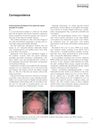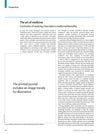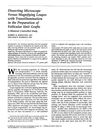 12 citations,
November 2011 in “International Journal of Dermatology”
12 citations,
November 2011 in “International Journal of Dermatology” A woman developed a scalp condition from using minoxidil, which improved with a different treatment but left scarring.
 48 citations,
July 2018 in “Journal of The American Academy of Dermatology”
48 citations,
July 2018 in “Journal of The American Academy of Dermatology” Spironolactone helps reduce pain and lesions in hidradenitis suppurativa patients, and lower doses are also effective.
 3 citations,
April 2020 in “British Journal of Dermatology”
3 citations,
April 2020 in “British Journal of Dermatology” PRP treatment helps 70.1% of hair loss patients after two sessions.
 77 citations,
March 2021 in “Nature”
77 citations,
March 2021 in “Nature” Stress hormone corticosterone blocks a growth factor to slow down hair stem cell activity and hair growth.
 11 citations,
July 2010 in “The Lancet”
11 citations,
July 2010 in “The Lancet” Chocolate has been historically used for medicinal purposes, with current research focusing on heart health benefits, but the extent of these benefits is debated.
 59 citations,
August 1998 in “International Journal of Dermatology”
59 citations,
August 1998 in “International Journal of Dermatology” Genetics and hormones cause hair loss; finasteride treats it safely.
 5 citations,
October 2012 in “Journal of Midwifery & Women's Health”
5 citations,
October 2012 in “Journal of Midwifery & Women's Health” Healthcare providers should start with simple fertility tests and treatments before referring patients to specialists.
 71 citations,
January 2015 in “The Scientific World Journal”
71 citations,
January 2015 in “The Scientific World Journal” Insulin resistance may contribute to various skin diseases and treating it could improve skin health and prevent more serious conditions.
 41 citations,
December 2008 in “Current Opinion in Ophthalmology”
41 citations,
December 2008 in “Current Opinion in Ophthalmology” Certain eye surgery complications can be managed effectively, especially in patients who have used specific prostate medications.
 28 citations,
August 2013 in “Facial Plastic Surgery Clinics of North America”
28 citations,
August 2013 in “Facial Plastic Surgery Clinics of North America” Body and beard hair can be used for hair restoration in severely bald patients, but the technique is complex and costly.
 22 citations,
September 2018 in “Medical Clinics of North America”
22 citations,
September 2018 in “Medical Clinics of North America” Facial aging is caused by natural processes and external factors, and can be managed with preventative measures and a variety of treatments tailored to individual needs.
 18 citations,
March 2014 in “Current Pharmaceutical Biotechnology”
18 citations,
March 2014 in “Current Pharmaceutical Biotechnology” Metformin helps regulate menstrual cycles, induce ovulation, and improve pregnancy outcomes in women with PCOS.
 1 citations,
September 2023 in “Journal of drugs in dermatology”
1 citations,
September 2023 in “Journal of drugs in dermatology” Alopecia areata causes unpredictable hair loss and emotional distress, with no cure and limited treatment options.
 July 2022 in “Journal of the Dermatology Nurses' Association”
July 2022 in “Journal of the Dermatology Nurses' Association” The document encourages attending the 2023 Dermatology Nurses' Association Convention.
 March 2015 in “Hair transplant forum international”
March 2015 in “Hair transplant forum international” Finasteride can help treat men's hair loss but may have side effects.
3 citations,
January 2020 in “Springer eBooks” The book guides surgeons on effective hair restoration techniques, including PRP, to achieve the best results.
2 citations,
January 2021 in “Springer eBooks” PRP is useful for hair restoration, facial rejuvenation, and wound healing.
 4 citations,
March 2014 in “PubMed”
4 citations,
March 2014 in “PubMed” Monoethanolamine-based hair colorants can cause more damage to hair than ammonia-based ones.
 September 2021 in “Physiology News”
September 2021 in “Physiology News” The Society had a promising start to 2021 with a new online platform, grants program, and elected Trustees.
March 2020 in “bioRxiv (Cold Spring Harbor Laboratory)” Health issues in retired breeder guinea pigs don't affect experiment success.
 August 2019 in “bioRxiv (Cold Spring Harbor Laboratory)”
August 2019 in “bioRxiv (Cold Spring Harbor Laboratory)” The model successfully predicted new uses for existing drugs, like using certain hormonal and heart medications for respiratory and Parkinson's diseases, and a cancer drug for diabetes.
 4 citations,
May 2017 in “Hair transplant forum international”
4 citations,
May 2017 in “Hair transplant forum international” Using implanters in hair transplants can improve outcomes and cause less damage to hair follicles.
 April 2005 in “AORN Journal”
April 2005 in “AORN Journal” The book is a detailed guide on dermatologic surgery techniques, recommended for both new and experienced doctors.
 25 citations,
August 1998 in “Dermatologic Surgery”
25 citations,
August 1998 in “Dermatologic Surgery” Dissecting microscopes give more and better quality hair grafts than magnifying loupes.
 4 citations,
May 2021 in “Dermatologic Clinics”
4 citations,
May 2021 in “Dermatologic Clinics” The conclusion is that hair loss in women is caused by a mix of hormonal, environmental, and genetic factors, and treatments should target these various causes.
16 citations,
May 2011 in “The Journal of clinical investigation/The journal of clinical investigation” Some skin tumors may start from hair follicle stem cells.






















